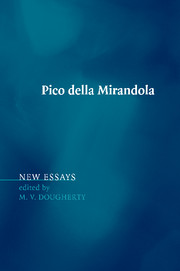Book contents
- Frontmatter
- Contents
- List of Contributors
- Pico della Mirandola
- 1 Introduction
- 2 Pico on the Relationship of Rhetoric and Philosophy
- 3 Pico, Theology, and the Church
- 4 Pico della Mirandola's Philosophy of Religion
- 5 The Birth Day of Venus: Pico as Platonic Exegete in the Commento and the Heptaplus
- 6 Three Precursors to Pico della Mirandola's Roman Disputation and the Question of Human Nature in the Oratio
- 7 Pico on Magic and Astrology
- 8 Pico's Quest for All Knowledge
- 9 A Life in Works
- Index
9 - A Life in Works
Published online by Cambridge University Press: 08 February 2010
- Frontmatter
- Contents
- List of Contributors
- Pico della Mirandola
- 1 Introduction
- 2 Pico on the Relationship of Rhetoric and Philosophy
- 3 Pico, Theology, and the Church
- 4 Pico della Mirandola's Philosophy of Religion
- 5 The Birth Day of Venus: Pico as Platonic Exegete in the Commento and the Heptaplus
- 6 Three Precursors to Pico della Mirandola's Roman Disputation and the Question of Human Nature in the Oratio
- 7 Pico on Magic and Astrology
- 8 Pico's Quest for All Knowledge
- 9 A Life in Works
- Index
Summary
A Historiographical Problem
Why is the life of an author and particularly that of a philosopher of any interest? The belief that philosophy was something with a history originated, at least in the West, with Diogenes Laertius in his Lives of the Philosophers. All the same, if the life of a philosopher is a bios theoretikos, and what matters in philosophy is theoria, what is the value of a bios as such?
As Eugenio Garin has often noted, a study of the fortune and reception of Pico's thought over the course of time is long overdue. The philosopher's reputation has varied significantly; in the last century, it was subject to reactions that were alternately too “modern” or too conservative. In the nineteenth century, the figure of Pico struggled to disentangle itself from a web of fantastical anecdotes that presented him as a young wealthy nobleman of prodigious memory, a connoisseur of arcane disciplines, an expert in oriental languages, a man condemned by the church, and a friend of both Lorenzo de' Medici and Girolamo Savonarola. Despite this trend, a number of French historians and Italian scholars did manage to publish a wealth of unknown documents and archival material that became the basis for research in the next century.
In the twentieth century, the situation underwent a profound change. As Garin once again noted, Pico's significance and contribution to the age of humanism, especially in the fields of philosophy and science, were reconsidered.
- Type
- Chapter
- Information
- Pico della MirandolaNew Essays, pp. 202 - 220Publisher: Cambridge University PressPrint publication year: 2007

